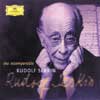Incomparable Rudolf Serkin
A fine tribute to one of the 20th-century’s greatest pianists
View record and artist detailsRecord and Artist Details
Composer or Director: Wolfgang Amadeus Mozart, Ludwig van Beethoven, Johannes Brahms
Genre:
Instrumental
Label: Deutsche Grammophon
Magazine Review Date: 7/2003
Media Format: CD or Download
Media Runtime: 119
Mastering:
Stereo
DDD
Catalogue Number: 474 328-2GM2

Tracks:
| Composition | Artist Credit |
|---|---|
| Sonata for Piano No. 30 |
Ludwig van Beethoven, Composer
Ludwig van Beethoven, Composer Rudolf Serkin, Piano |
| Sonata for Piano No. 31 |
Ludwig van Beethoven, Composer
Ludwig van Beethoven, Composer Rudolf Serkin, Piano |
| Sonata for Piano No. 32 |
Ludwig van Beethoven, Composer
Ludwig van Beethoven, Composer Rudolf Serkin, Piano |
| Sonata for Cello and Piano No. 1 |
Johannes Brahms, Composer
Johannes Brahms, Composer Mstislav Rostropovich, Cello Rudolf Serkin, Piano |
| Concerto for Piano and Orchestra No. 16 |
Wolfgang Amadeus Mozart, Composer
Chamber Orchestra of Europe Claudio Abbado, Conductor Rudolf Serkin, Piano Wolfgang Amadeus Mozart, Composer |
Author: Bryce Morrison
DG’s two-disc tribute is rightly called ‘The Incomparable Rudolf Serkin’. ‘A passionate puritan’ (as Jeremy Siepmann tells us in his vivid and personal accompanying essay), his integrity and musicianship were among the wonders of 20th-century recreative artistry and energy. And even in these recordings from Serkin’s later years, when the strain of the occasion inevitably tells, the essential character remains.
Fingers, arms and shoulder muscles may ache – most notably in the Beethoven sonatas – yet Serkin’s spirit shines through an almost palpable strenuousness. True, there are passages in Op 111 which sound more like a stiff-jointed rehearsal session; there are moments in, say, the second movement’s L’istesso tempo, when the rhythm buckles; and there are many other details in all three sonatas where Serkin is clearly no longer fully in command. But to accuse him of weak trills in Variation 2 from Op 109’s finale, of heavy weather in Var 3, of a memory lapse in Var 4 and of a gaunt and angular tone in the normally seraphic final restatement of the theme, is somehow to miss the point. These may be warts-and-all performances but they nonetheless compel attention in every searingly intense bar.
When you turn to less demanding fare such as the Brahms E minor Cello Sonata with Rostropovich and Mozart’s K451 Concerto with Abbado you hear playing where Serkin’s unique candour is less obviously battle-scarred. Serkin never did countenance small talk or self-conscious felicities and if his Mozart is plain-speaking it is unforgettably joyous, notably in the finale where his relish and delight in such tireless invention are irresistible. In the Brahms both he and Rostropovich forget their customary energy and offer a performance of a profoundly elegiac beauty. Listen to their hushed magic at 9'59" in the first movement, to their gently propelled Minuet and to a dignity and restraint that never exclude vitality in the finale, and you are made aware of a consummate quality unattainable to lesser mortals. This is arguably a mixed tribute, but at its greatest it is truly ‘incomparable’, finely remastered and touchingly illustrated by DG.
Fingers, arms and shoulder muscles may ache – most notably in the Beethoven sonatas – yet Serkin’s spirit shines through an almost palpable strenuousness. True, there are passages in Op 111 which sound more like a stiff-jointed rehearsal session; there are moments in, say, the second movement’s L’istesso tempo, when the rhythm buckles; and there are many other details in all three sonatas where Serkin is clearly no longer fully in command. But to accuse him of weak trills in Variation 2 from Op 109’s finale, of heavy weather in Var 3, of a memory lapse in Var 4 and of a gaunt and angular tone in the normally seraphic final restatement of the theme, is somehow to miss the point. These may be warts-and-all performances but they nonetheless compel attention in every searingly intense bar.
When you turn to less demanding fare such as the Brahms E minor Cello Sonata with Rostropovich and Mozart’s K451 Concerto with Abbado you hear playing where Serkin’s unique candour is less obviously battle-scarred. Serkin never did countenance small talk or self-conscious felicities and if his Mozart is plain-speaking it is unforgettably joyous, notably in the finale where his relish and delight in such tireless invention are irresistible. In the Brahms both he and Rostropovich forget their customary energy and offer a performance of a profoundly elegiac beauty. Listen to their hushed magic at 9'59" in the first movement, to their gently propelled Minuet and to a dignity and restraint that never exclude vitality in the finale, and you are made aware of a consummate quality unattainable to lesser mortals. This is arguably a mixed tribute, but at its greatest it is truly ‘incomparable’, finely remastered and touchingly illustrated by DG.
Discover the world's largest classical music catalogue with Presto Music.

Gramophone Digital Club
- Digital Edition
- Digital Archive
- Reviews Database
- Full website access
From £8.75 / month
Subscribe
Gramophone Full Club
- Print Edition
- Digital Edition
- Digital Archive
- Reviews Database
- Full website access
From £11.00 / month
Subscribe
If you are a library, university or other organisation that would be interested in an institutional subscription to Gramophone please click here for further information.




